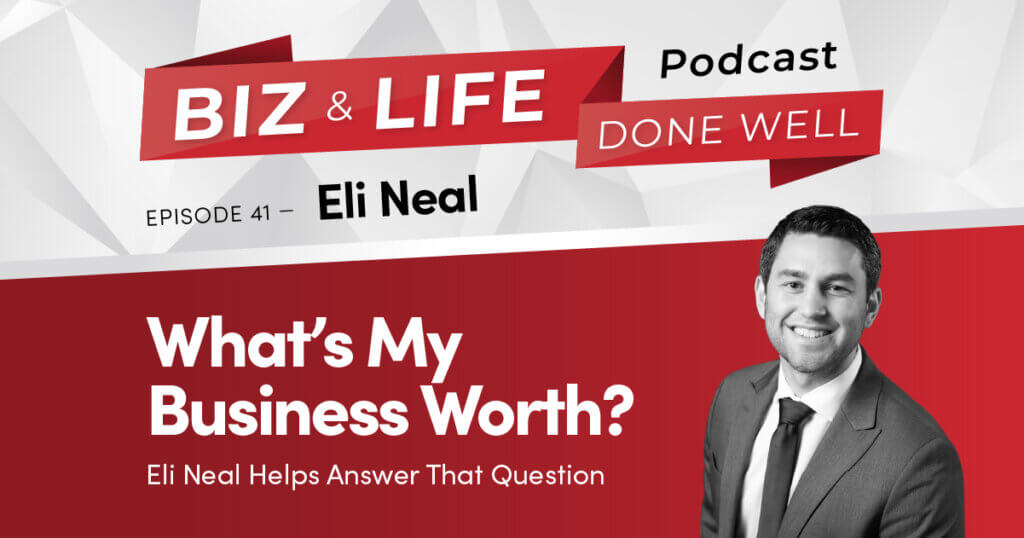Title: What’s My Business Worth? Eli Neal Helps Answer That Question
Guest: Eli Neal
Eli: How do you decide what to do with your business if you don’t know what it’s worth? How can you make a good decision about whether to buy out a business partner or sell your business or give it to your kids? How do you know what to do with your business if you don’t know the value?
Peter: Today, my guest is Eli Neal. He is the founding principal of Four Corners Financial Forensics. He does business valuations. I’ve worked with him, full disclosure, he helped me understand the value of my business. And today we’re going to talk about what your business is worth.
How do you know? What does that process look like? And at the end of the day, what is the value of having that done?
Peter: Welcome to the Biz and Life Done Well podcast, where we explore what it means and what it takes to do business and life well. I’m your host, Peter Wilson. If you’re like me, you’re intrigued by stories of common people who have achieved uncommon success in business and life. Join me as I interview fascinating people about how they got started, their successes and failures, their habits and routines, and what inspires them.
Peter: Eli, thanks for joining us today.
Eli: Thank you so much for having me. Pleasure to be here.
Peter: You’re located in Bellevue, have been doing this for a while. You’re the founding principal of your organization. How did you get into this line of work?
Eli: So I graduated from university of Washington and I started out of college with an accounting degree at Ernst and Young. And so I did public accounting and auditing for about four years, and that was about all I wanted to do to be a necessary kind of evil to business owners in auditing their books and checking their financials. I really wanted to start providing value to them and helping them and I wanted them to be happy when I walked through their doors. And so I had a former co worker that was doing business valuations and helping small business owners. And I joined her at her firm and I loved being able to connect with lots and lots of business owners across many industries.
And I really felt like I was helping them and that was a great feeling.
Peter: Why do business owners come to you to get their business appraisal?
Eli: Yeah, there’s a lot, there’s lots of reasons. I would say, I would say the biggest reason on the front side is, you know, how, as a business owner, how do you decide what to do with your business if you don’t know what it’s worth? How can you make a good decision about whether to buy out a business partner or sell your business or give it to your kids and hope that they don’t screw it up. How do you know what to do with your business if you don’t know the value? So I really enjoy consulting with business owners on the front end to help them think about that value question.
Peter: One of the things that you had mentioned in our brief conversation before was succession plannings. You’ve got a business owner, I’ve owned my business for about ten years. So, I’m assuming that’s sort of the age, maybe a little older that people start wondering about what they’re going to do with their business. You see that a lot.
Eli: Yeah. And there’s so many kind of baby boomers as they’ve all been clumped together that are hitting late 50s and 60s thinking about what’s next. And it’s a huge decision and a really complicated one with with lots of emotions behind it because people have been running their business for years and years, decades. And so, you know, the first thing that I, that I want is information before I make a decision. And so providing a good solid number and value on their business is a good first place to start in that decision making process.
Peter: So then there’s also some unhappy reasons, right? Divorce, maybe a dispute with a business partner. I’m sure you’ve probably seen it all.
Eli: That’s exactly right. And that’s probably one thing that makes me different than a lot of other valuation professionals is that I do business valuations in the context of disputes often. And so I’m testifying to my value in front of a judge and a jury, and that really sharpens my work, you know, in the dispute context, but then for just consulting in a non dispute context, because, you know, my, my work product is, is very credible. I do a deep dive. I’m very confident in the work that I do.
So I think that help the dispute work helps, my valuation practice and ultimately helps the business owner get a number that they can depend on.
Peter: So what is the range of the types of businesses that you work with?
Eli: I have valued companies that are worthless. They have more debt than they have value. And I think the largest company I valued was $1,400,000,000 And so anything in between 0 and $1,400,000,000 I have, I’m confident that I can do that. That’s my range and all different kinds of industries, you know, manufacturing. I was an early provider of services to the cannabis businesses as well.
When many professionals, you know, we’re, unsure whether to provide them service. You know what, at the end of the day, businesses are businesses. It’s a lot about revenues, but more about profits and the earnings stream.
Peter: What are the valuation approaches that you take? What does that look like?
Eli: Yeah, so there’s a lot of literature behind business valuations and a body of knowledge. That comes through with there’s three different ways to value a business. And the first is the income approach. And for the income approach, we’re looking at your cash flows out into the future and projecting what we think your cash flow is going to look like the next years. And then we’re discounting that back to today in present value based on how risky your company is.
And so the two main variables there are cash flows and risk of those cash flows. And then the second approach is the market approach. And for that, we look at your business and we have databases with tens of thousands of closed transactions from over the years. And we look in those databases for companies that are comparable to yours, similar to yours, in terms of both size and operations. And sometimes, sometimes it’s easier than others.
Sometimes it’s a gas station and there’s tons of gas stations across the country. And then sometimes, you know, it’s, it’s a very niche manufacturing process and there’s really no good comparables, but we do that search and, hopefully we can find good comparables and then we look at the multiples of those transactions price compared to revenue or price compared to earnings and we apply that to your business. So that’s the market approach. And then the third approach is the asset approach. And that looks at the value of your hard assets minus your debts.
And that is typically the lowest form of value because you know, if you’re not generating a profit and what you’re left with is your used equipment, it’s just not going to be worth much on the secondary market. And so unless you’re a real estate holding company, if you’re an operating business, we’re really hoping we’re not using the asset approach.
Peter: Got it. What’s an example of, you know, of a good story or a you know, happy outcome or maybe a crisis averted?
Eli: For crisis averted. I’ve got a good story for you. I was valuing just consulting succession planning for a business owner that owned a mail and shipping center. And so I did work with her. I provided to her PDF schedules and I always, with my consulting, I take an hour or an hour and a half on the backend to make sure that the business owner really understands the value and how I arrived at it and how it relates to their business.
And so she got my value, decided she wanted to move forward with a broker and sell her business. And the broker came back and gave her a proposed selling price. Less than half of what I had come up with. So of course she was taken aback, forwarded it to me. I looked at his his work, his valuation work, valuation and air quotes.
And he had just taken the first five months revenue of the business divided by five, multiplied by 12 annualized her revenues and thought that he was looking at a really small company. But what he missed is that shipping is such a seasonal industry. And so he missed October, November, December, the largest shipping months of the year. And so I was able to respond and point that out. And then I showed him my work and he, he said, yep, I agree with Eli.
And so she, ended up listing her price for my amount instead of less than half. And if not for our consulting work on the front end, you know, I’m not sure that she would have known the value of her company and definitely wouldn’t have been in a strong of a position to change the broker’s mind and assert for herself.
Peter: When I was thinking about working with you, one of the things that I was thinking about is, let’s say an opportunity came up for me to either, let’s say somebody walked in and say, Hey, I’d like to buy your business. I’d like to have some idea of what it’s actually worth based on some real numerical accounting investigation, not just, I feel like it’s worth this or I feel like it’s worth that. And the other thing is I was thinking about was if there is a transaction where I could be the acquirer, then I would at least have some notion of what to look for in terms of the numbers, right? And you really gave me a good education on that. It’s not just you came up with a number and threw it over the fence.
I really appreciated, like you said, the consulting piece of it too, where you really go into the puts and takes of the different valuation models. You had also related to me another story that was, you know, maybe less fulfilling for the recipient perhaps. Do you mind relating that to me again about somebody who may have should have turned to you early on perhaps?
Eli: They’re not all happy stories, but the numbers are the numbers, you know, they’re, you know, I can’t change them. The value is the value. And so in my unhappy story, the business owner wasn’t getting along with their business partner anymore, which is common. There were fifty, fifty owners. And in that case, one owner has to buy out the other owner and everyone understands that.
And then the question is at what price would one owner buy out the other owner? And to me, if that’s even considered, that’s a great time to get a professional in, because again, you want to be making decisions with real correct information that’s informed. And, and unfortunately in this case, one business owner, the one that was being bought out proposed that she’d be bought out for a million dollars. The other owner said, no way, there’s no way that our business is worth that much. That 50% at 1,000,000 would mean it’s a $2,000,000 company.
He said, no way. And so you rejected it, which triggered each business owner to get their own formal appraisal. So that’s a lengthy report. And if those business, if those appraisers cannot agree, then it goes to a third appraiser. And so all of a sudden you’re getting three full appraisal reports which the full reports are not inexpensive.
There’s fifty, sixty page documents. And so by the end, so he hired me for the formal appraisal and he was very disappointed to find out that his business really was worth close to $2,000,000 and that $1,000,000 was maybe a little high, but not so high as to incur all the attorneys costs on each side, the appraisal costs on each side. And then they ended up needing third appraiser in the middle. And so, you know, tens of thousands of dollars of fees where if he had engaged me to value consult on the front end, inform his decision making process, which is, you know, what I like to do. He could have avoided all of that and felt confident that he wasn’t overpaying, that he was just paying a fair amount and could have avoided excess fees.
And I think, you know, sadly it got really contentious between these fifty, fifty owners that had been friends for the past ten years. There’s an emotional toll as well as financial.
Peter: You have an article on your website that I’ve been looking at here. What is the process for a business valuation? So your website is the number four Corners FF for financial forensics. So fourcornersff.com. And in your blog here, you’ve got this article, what is the process for a business valuation?
And you and I were chatting just briefly before we got on about this process. And I think this is a great article because it kind of lays out just what’s involved in the actual process. And one of the things I was going to mention, people can go there and I’ll have a link to this in the show notes. But one of the things that I really enjoyed and that you pointed out too is this step five in the process, which is this management interview. So first you’ve got just some document gathering and intros and what are we trying to do here.
And I had to give you a whole lot of data exported from QuickBooks and all that. But then you got to this management interview. I thought that was fascinating because roughly an hour, hour and a half of just looking at the qualitative factors impacting the business, what I enjoyed about it is it really made me think about factors that I had never considered in the value of the business. You want to touch on that a little bit?
Eli: That’s my favorite part of the whole process is the management interview. It’s me, it’s me and the owner and founder reflecting on the business and where it started and where it is now. And, and we really focus that, that interview on the qualitative factors, you mentioned. And so we talked through the customer mix. That’s so important to how risky or not risky your business is.
Do you have one customer that makes up 60% of your revenue? If that’s the case and that customer goes away overnight, your business looks dramatically different. And in some, in some cases we’ve seen businesses where they have a flagship product and there’s only one vendor in the whole world that can make an input to that product. And so again, if that vendor goes out of business, yeah, you know, business is in a lot of trouble. And so we’re uncovering those risk factors for us, the business valuation, but I think also for the business owner, because maybe they haven’t ticked.
You know, there’s about 12 categories that we walk through. And maybe it’s been a while since they’ve reflected on who their customers are, who their vendors are, who key people are in the management team is another big one. Is there one rainmaker that makes all the sales? Yeah, that’s important. Geographic differences, regulation differences.
There’s a laundry list of factors that we talk about. You know, how is the business thinking about it? And it’s just so fun to watch to learn about different industries and then watch the business owners reflect and talk about how they’re mitigating those risks.
Peter: Do you have kind of a ballpark of what it would cost to get started with your services?
Eli: It depends on the business and how unique it is, of course, and what the process is and what they’re hoping to gain out of it. But the low end of the work product is you know, Excel schedules put into PDF and then me walking the business owner through those schedules. Then up from there for a $5,000,000 business, I think there’s probably multiple stakeholders. So there’s a middle ground, which is a calculation letter. And that’s a 10 to 12 page letter that memorializes considerations and can be stuck in the file and referred back to as the company gets bigger.
And then of course the full valuation report for IRS purposes. But so along, I would say a general range is maybe around the $5,000 mark for the Excel schedules and management interviews talking through and then up to 20,000 or if it’s in dispute, you know, it can be even, even more than that, which is why I want to make sure business owners have the right information first before they get in a dispute. The right information helps you make good decisions. And that’s what I want to help business owners with.
Peter: I know so many business owners that are kind of in that $1 to $3.4000000 range that I think could really benefit from your services or services like yours. But I like you, so.
Eli: Yeah, I appreciate that. Yeah, and the business owners that are 1 to 3,000,000, where it’s kind of just them and they’re thinking about what to do with their business, with their baby, that they spend all this time. That’s the per that’s the perfect person that I can really help with the consulting and just to give them a number and walk them through the number. And I think you and I talked about at the end, you know, this is probably the value, what a third party buyer would pay, but maybe this is the value and it’s a higher value that a competitor would pay because the competitor already has a lot of the backbone of the business handled. They just want the customers.
And so you and I, because in our intro call, we talked about it. You know, I kind of knew that that was of interest to you. And so, and so we talked about it and, and cause there’s a lot of ways to sell your business. There’s a lot of different people to sell your business. So yeah, that, that 1 to $3.01 to $4.01 to 5,000,000 revenue business.
You know, I think, I think there’s a lot of value to be gained consulting, no pun intended. And I love working with those business owners.
Peter: Well, again, if you’d like to get in touch with Eli, you can visit his website. It’s at 4cornersff.com. Check out his blog. He’s got an article there about what is the process for a business valuation. And he’s got a contact form on his site.
You just fill out the contact form and he’s very prompt at getting back to you.
Eli: And there’s actually a button. You can fill out the form if you would like, but there’s even a button that you can just click through Calendly and just book time right on my calendar.
Peter: Got it.
Eli: We can set up a zoom automatically and talk and in a way we go. And yeah, the intro call of course is free. We got to make sure what your hopes and dreams are, and we got to make sure we’re on the same page And then whether I can assist you, because I only want to, I only want to help you if I can help you. And so that’s what we’ll figure out together.
Peter: Was there anything you wanted to add to the conversation? Anything we missed?
Eli: No, I think, I think that, we covered it. I am a responsive guy and I like to do good work and I’m willing to testify to it. And, and, and that work, you know, I think is best served helping business owners before they’re in any kind of dispute or before, hopefully they’ve made the wrong decision. Let’s move the whole process forward. And at the end of the day, just make good decisions financially and personally.
Peter: That’s great. Thank you so much.
Eli: It’s my pleasure. Thanks for having me.
Peter: Thanks for listening to this episode of Biz and Life Done Well with Peter Wilson. You can subscribe to us on iTunes, Google Podcasts, Spotify, and most of the other popular podcast platforms. Please tell your friends about us and leave us a review so even more people will find out about us. Thanks again. We’ll see you soon.



